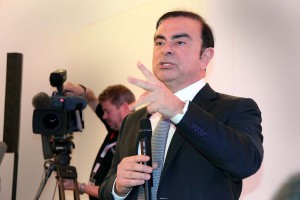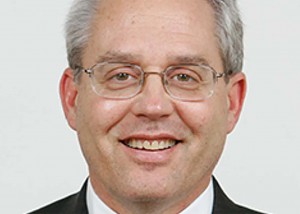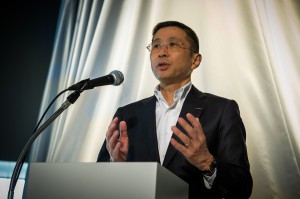
Carlos Ghosn was released from a Tokyo detention center after the appeal to deny him bail was denied.
Nearly four months after he was unceremoniously yanked off a private jet after landing at Tokyo’s Haneda Airport, former Nissan Chairman Carlos Ghosn was escorted out of the Tokyo Detention Center on Wednesday, looking gaunt and wearing both a surgical mask and cap.
The executive was freed a day after a Tokyo District Court ordered him released on 1 billion yen, or $8.9 million, bail. Prosecutors had previously blocked the release of the Brazilian-born executive but lost an appeal of the release order this time.
“I am innocent and totally committed to vigorously defending myself in a fair trial against these meritless and unsubstantiated accusations,” Ghosn, who will turn 65 on Saturday, said in a statement issued shortly before his release.
The one-time head of the Euro-Asian Renault-Nissan-Mitsubishi Alliance had just arrived in Japan when authorities boarded his jet and arrested both Ghosn and his lieutenant, Greg Kelly. The two were subsequently accused of participating in a series of misdeeds that included concealing as much as $88 million of Ghosn’s income.
(Tokyo court grants Ghosn bail, but move under appeal. Click Here for the story.)
The scandal was touched off by an internal investigation at Nissan triggered by what the company said was a “whistleblower.” But some observers – including senior-level sources who have talked to TheDetroitBureau.com – question the merits of the case and raise concerns that the case is really more about an ongoing dispute between Nissan and Renault over who holds power in their 20-year alliance.

Former Nissan colleague Greg Kelly, who was released on bail a few months ago, also was indicted Friday.
Ghosn himself complained that the scandal was the result of “plot and treason,” in an interview with the Japanese newspaper Nikkei last month.
Since his arrest, the architect of the alliance was kept in solitary confinement in downtown Tokyo and given access to virtually no one other than his lawyers and prosecutors who repeatedly interrogated him and tried to get Ghosn to sign a confession in Japanese, a language he does not speak.
In January, shortly before an appearance in Tokyo court where his first bail request was denied, Ghosn looked pale and slimmer than before his arrest. In a French news interview, his son claimed the once high-flying executive had already lost 10 kilograms, or 22 pounds.
“He is catching his breath and settling in,” Jean-Yves Le Borgne, Ghosn’s French lawyer, told the AP after the executive was released.
The bail request was finally granted just weeks after Ghosn fired his original defense team and brought in Junichiro Hironaka. Known as “The Razor,” he has a record of winning acquittals for high-profile clients in a country where prosecutors routinely win over 90% of their cases.
(Click Here to see how “plot and treason” brought Ghosn down, jailed exec says.)
Hironaka has echoed other observers who have used the Ghosn case to raise concerns about the Japanese justice system. The attorney has pointed to the way prosecutors can endlessly delay the release of suspects in a bid to force confessions, calling it “hostage justice.”
The case has also become something of an embarrassment to Nissan and its CEO Hiroto Saikawa. The one-time Ghosn protégé has been accused by some of using the scandal as a lever to try to pry more power away from Renault.
The French automaker launched a $6 billion bailout of the then-crumbling Japanese automaker in 1999. Ghosn was put in charge of the rescue and later was named Nissan CEO. He subsequently took on the same role with Renault, as well as being appointed head of their alliance. Because Renault holds a 43.4% stake in its partner, it gets to name some Nissan board members and senior executives unilaterally.
Wednesday’s development means Ghosn will no longer have to sleep on a mat on the floor of a small cell, but he still faces the prospect of a trial that could send him back to prison for a decade or more. As part of the terms attorney Hironaka negotiated, Ghosn will be monitored to ensure he doesn’t try to flee Japan or somehow tamper with evidence in the case.
Even if he wins release, Ghosn may wind up embroiled in a separate legal matter in France where Renault last month moved to block him from collecting a multi-millionaire payout triggered by his resignation from the automaker. He may also sue Nissan should he be cleared in Japan.
The automaker itself now faces charges in Japan for its failure to block or previously report the alleged secret pay scheme. A number of observers have questioned how such a matter would have gotten by CEO Saikawa and other senior managers and board members.
(Ghosn’s new attorney blasts Nissan, Japanese prosecutors. Click Here for more.)
Ghosn’s bail release comes more than two months after his former Nissan colleague Kelly was released on Christmas Day. Kelly had been scheduled to have neck surgery in the days after his arrest and was reportedly released to allow him to seek medical care. Like Ghosn, he is required to remain in Japan until his trial.

